Welcome back to the Oathbreaker battlebox series! Since we are returning to Theros this weekend, it only seemed appropriate for the next article in our series to be about the Theros-born hero himself, Gideon Jura (may he Rest In Peace []).
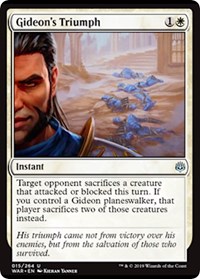
As I mentioned in my Liliana Intro Box article, my goal for this series is to provide one deck for each of the five original members of the Gatewatch, with their respective triumphs as their signature spells. This was relatively straight forward for Liliana, Untouched by Death [] with Lilianas Triumph [], but Gideon's Triumph [] has a few more conditions we need to worry about. Like Lilianas Triumph [], this card can be used to force opponents to sacrifice creatures. Unlike Liliana’s, those creatures have to attack or block first. Cards like this are designed to be a surprise, which doesn’t work as well when they are displayed face-up your command zone.
I Need a Hero!
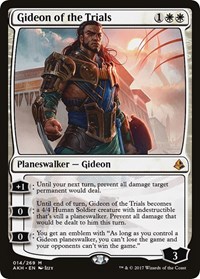
Gideon of the Trials [] was destined to pair with this spell. Once you have the emblem (which you can get immediately), your opponents can’t win the game as long as you have at least one Gideon in play. The question then becomes: which opponent is willing to attack into Gideon’s Triumph [] first?
The emblem does not care which Gideon we have in play, which entices us to play as many as our budget allows. Across all of his incarnations, Gideon focuses on protecting you, helping you go wide to alpha strike with creatures, and turning himself into an almost unstoppable creature to get in for damage. While we will probably only make him a creature to close out games or as a last resort, his other two themes strengthen our existing game plan and add another subtheme to the deck: going wide.
Hey Soul Sister
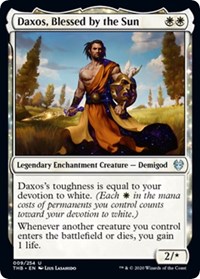
Soul sisters is one of my favorite deck archetypes, entirely because of my nostalgia of playing Soul Warden [] in multiplayer long before the formats of Commander and Oathbreaker even existed. When I saw Daxos Blessed by the Sun [] previewed for Theros: Beyond Death, I knew I wanted him in this deck. Besides Daxos, there are seven other effects that will give us incremental life gain: Soul Warden [], Ajanis Welcome [], Answered Prayers [], Ashes of the Abhorrent [], Impassioned Orator [], Diamond Mare [], and Suture Priest []. My favorite among these is Suture Priest [], because the incremental life loss against your opponents helps grind toward a victory.
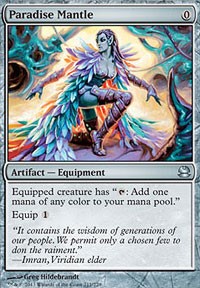
Or course, life gain by itself is not a win condition, but we do have some excellent payoffs for gaining life. Dawn of Hope [] will draw cards while Angelic Accord [] will flood the board with angel tokens. Ajanis Pridemate [] becomes a progressively bigger threat that absolutely has to be answered.
The payoff your opponents might not see coming is Paradise Mantle []. At first glance, you might think it is only in the deck to set up for some late game mana. But, when equipped to Famished Paladin [], you produce one mana for each life gain trigger!
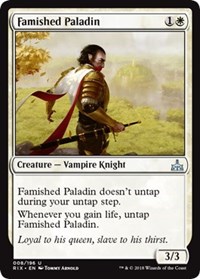
Since we are already playing lots of small creatures, cards such as Mentor of the Meek [] and Bygone Bishop [] can help us draw cards. We can get additional card advantage from Custodi Soulcaller [] and Bishop of Rebirth []. (One neat trick is to keep recurring Kami of False Hope [] to keep your defenses up).
You Shall Not Pass!
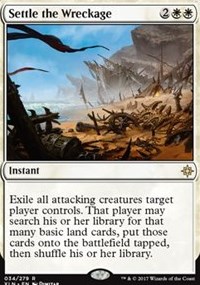
Speaking of defenses, gaining life will keep us safe should we have trouble keeping a Gideon in play, but it does nothing to actually protect your Gideons. That’s why this deck also leans heavily into effects that can answer alpha strikes. It’s very likely that the emblem and your high life total will paint a target on your back with few opportunities to make allies. Damage prevention effects such as Riot Control [], Chant of Vitu Ghazi [], and Settle the Wreckage [] can deal with overwhelming waves of attackers. Wing Shards [] is usually a better version of our signature spell, but definitely better as a surprise!
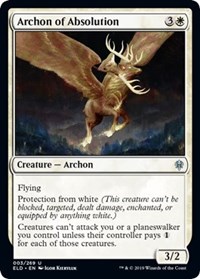
If we can ward off attacks before they happen, we can save more of our resources. Baird, Steward of Argive [] is an often overlooked card from Dominaria, and Archon of Absolution [] from Throne of Eldraine pairs with him nicely. Opponents will have to take a tempo loss to attack your Walkers Maze of Ith [], letting you keep playing lands early game while having an extra late game defense.
Defensive decks like this always have the same problem: closing out the game. Ideally, your Gideons and Angel tokens will get the job done, but we also have Felidar Sovereign [] to take the game if we can’t force enough damage through (or if attacking just isn’t your cup of tea). Just be sure you can keep it alive until your next upkeep!
The Deck
Oathbreakermtg asked that every deck in this series be under $50, and I’m trying to keep the lists as budget friendly as possible, with the budget version of this deck pricing in at just over $32 TCGmid. This means that some excellent cards for the strategy don’t make the budget cut. If you already have these cards in your collection, or want to upgrade the deck a bit further, consider these cards:
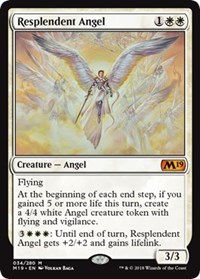
- Ashnods Altar [] is a mainstay of most token decks since you can exchange all those small bodies for an influx of mana. With some of the other cards in the list already, you can churn through several spells in one turn with this card.
- Skullclamp [] is also a staple in most token decks. We won’t be pumping our 1/1s for an alpha strike most of the time, but turning tokens into two cards in hand is super efficient way to keep answers available.
- Emeria, the Sky Ruin [] is a mostly free way to recur creatures like Kami of False Hope [] to keep our shields up through the game. Our mana base is mostly plains so you’ll get lots of activations from it.
- Resplendent Angel [] is another copy of Angelic Accord [], but with the bonus of being able to also be a 5/5 lifelinker in the air to ensure we get at least one angel token. It’s an easy swap for the more budget friendly Angel of Vitality [] in the main list.
- Finally, I did not include Gideon Blackblade [] or Gideon Ally of Zendikar [] entirely because they were the least budget friendly versions of Gideon. In theory, more Gideons make it easier to protect your emblem, so you may want to make some space for them.
Summing Up
This deck can be a challenge to pilot, but doing so well can be invigorating. There is a decent chance your opponents will focus on you for most of the game, but you can manage that with carefully placed life gain, removal, and damage prevention effects. You may have an opportunity to use all those damage prevention and creature removal effects for political maneuvering, but remember you’ll be the biggest target, which is an inherent political disadvantage. Above all else, your goal should be to slow the pace of the game until you can get past turns 5 and 6, where this deck starts to shine.
If you enjoyed this deck list, please consider donating to Magikids. The people who brought us Oathbreaker also run this amazing charity. Both monetary submissions and magic card donations are accepted. Magikids utilizes unused Magic: The Gathering cards to teach kids how to play the game in a safe, encouraging environment. If you contact them directly, they also have a wide selection of magic singles available. Purchasing your singles through them is a small step that can help them make a bigger impact.
As always, let us know your experiences with this deck. Comment below or tweet @oathbreakermtg.
Accountant, Freelance writer and editor, MTG Oathbreaker and Commander player.
